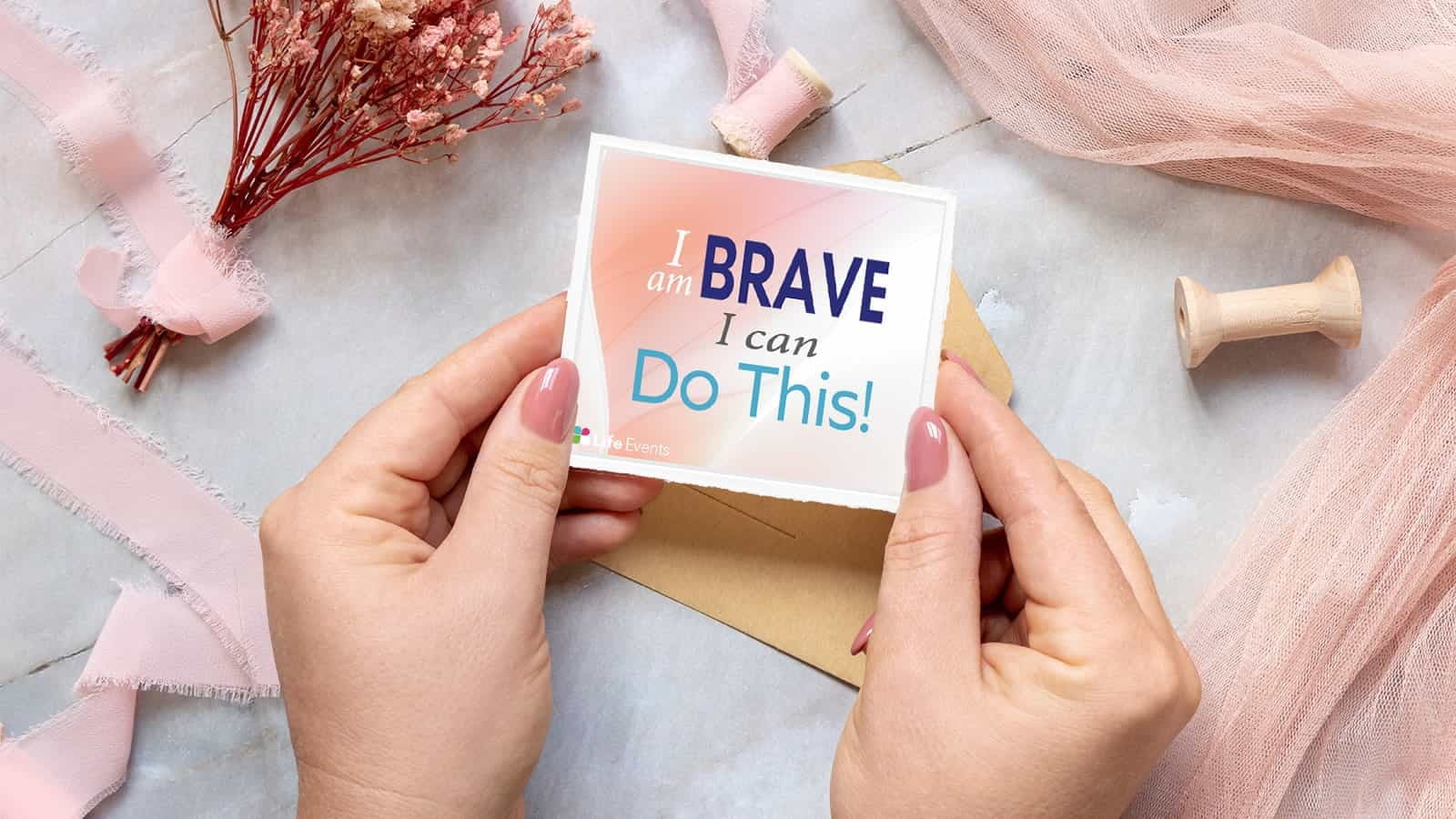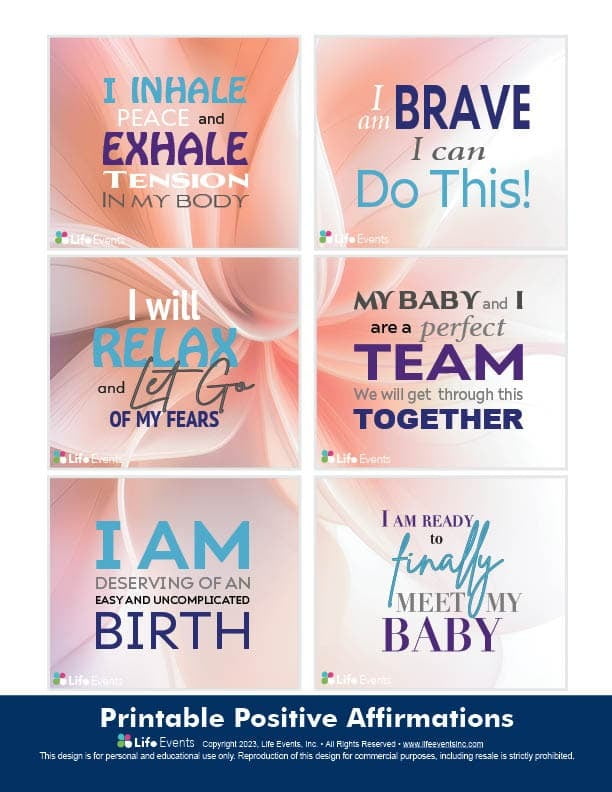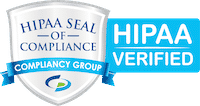Have you ever tried using positive affirmations in your daily routine? Private pep talks to one's self can feel a little awkward at first. But there's a reasonable amount of neuroscience to prove they work!

Pregnancy and giving birth are important moments in life, often accompanied by a range of emotional and physical challenges. Healthcare professionals are vital in supporting expectant parents on this journey. There's a growing interest in using positive affirmations to enhance mental well-being and potentially improve birth outcomes. This article explores evidence-based research and provides practical tips for implementation.
Complimentary Download
Before you continue, we invite you to download a complimentary printable affirmations page. These six science-based affirmations will help develop inner peace and enhance well-being. Use it yourself and feel free to share it with your clients. Get your copy at the following link: Free Childbirth Affirmations.
What are positive affirmations?
Positive affirmations are positive phrases or statements individuals repeat to themselves to challenge and eliminate negative or unhelpful thoughts. Effective affirmations often start in the present tense and are simple, brief, and specific. They can be used to manifest goals or to promote a positive mindset. Research has shown that practicing positive affirmations can lead to many benefits, including decreased stress levels, improved overall health, and increased well-being. Some examples of positive affirmations include "I am confident," "I am happy and grateful," and "My efforts help me succeed."1
The Science: How They Work
Using Affirmations for Childbirth
Implications for Healthcare Professionals
Common Questions About Affirmations
When is the best time to practice positive affirmations?
Ultimately, the most effective time to practice positive affirmations is when it feels natural and impactful for you. Consider establishing a daily routine, such as incorporating affirmations into your morning dressing routine or before bedtime. Additionally, during moments of stress or anxiety, taking a brief pause for a positive affirmation can help reshape your mindset and alleviate stress levels.
Do I need to practice them daily?
Can I use the same affirmation every day?
Should I say affirmations out loud or silently?
Both approaches can be effective, and your choice depends on personal comfort.
Out Loud:
Pros: Engages both auditory and vocal senses, reinforcing the message.
Cons: Impractical in some public or shared spaces.
Silently:
Pros: It can be practiced anywhere without drawing attention.
Cons: Some may find it less engaging without the auditory component.
What if I feel silly?
Creating Your Own Affirmations
Crafting affirmations involves creating positive and empowering statements aligned with your goals.
Utilize these techniques:
- Use positive language, such as "I am" statements.
- Phrase them in the present tense, as if the change has already occurred.
- Be specific, clear, and concise.
- Keep them achievable and believable. It's okay to start small.
- Adapt them as your goals or circumstances evolve.
Here are a few examples to inspire you:
- I am confident, capable, and strong.
- I attract positive energy and abundance into my life.
- I am worthy of love and treat myself with kindness.
- My possibilities are endless, and I create my own success.
Conclusion
Sources
1. Cascio, Christopher N., Matthew Brook O’Donnell, Francis J. Tinney, Matthew D. Lieberman, Shelley E. Taylor, Victor J. Strecher, and Emily B. Falk. “Self-Affirmation Activates Brain Systems Associated with Self-Related Processing and Reward and Is Reinforced by Future Orientation.” Social Cognitive and Affective Neuroscience 11, no. 4 (April 1, 2016): 621–29. https://doi.org/10.1093/scan/nsv136.
2. Rizki, Lailatul Khusnul, Nur Masruroh, and Esty Puji Rahayu. “Effects of Self-Affirmation and Positive Visualization Therapy for Anxiety in 3rd-Trimester Pregnant Women during the Pandemic.” Bali Medical Journal 12, no. 3 (September 21, 2023): 2797–2800. https://doi.org/10.15562/bmj.v12i3.4378.
3. Thitipitchayanant, Krittipitch, Ratana Somrongthong, Ramesh Kumar, and Naowarat Kanchanakharn. “Effectiveness of Self-Empowerment-Affirmation-Relaxation (Self-EAR) Program for Postpartum Blues Mothers: A Randomize Controlled Trial.” Pakistan Journal of Medical Sciences 34, no. 6 (2018): 1488–93. https://doi.org/10.12669/pjms.346.15986.
4. Lunda, Petronellah, Catharina Susanna Minnie, and Petronella Benadé. “Women’s Experiences of Continuous Support during Childbirth: A Meta-Synthesis.” BMC Pregnancy and Childbirth 18 (May 15, 2018): 167. https://doi.org/10.1186/s12884-018-1755-8.
5. Rahayu, Esty Puji, and Lailatul Khusnul Rizki. “The Effect of Positive Affirmations to Anxiety Level and 2nd Stage of Labor Length.” STRADA Jurnal Ilmiah Kesehatan 9, no. 2 (November 1, 2020): 900–905. https://doi.org/10.30994/sjik.v9i2.398.





